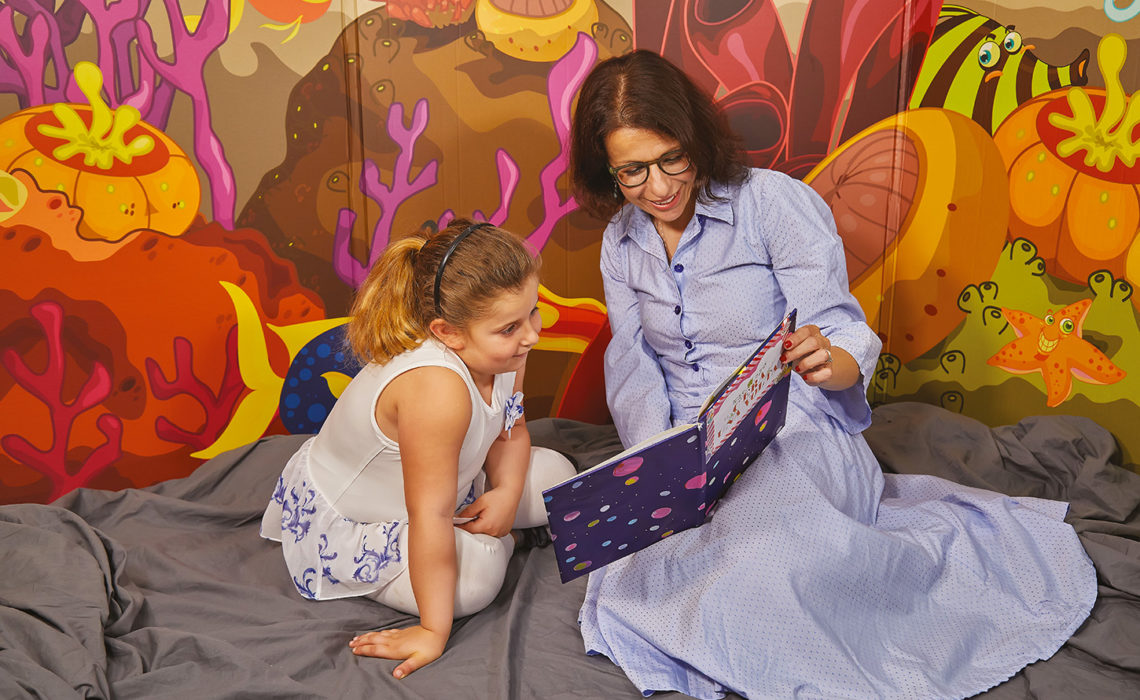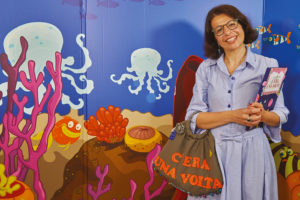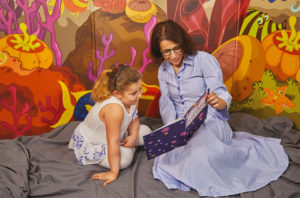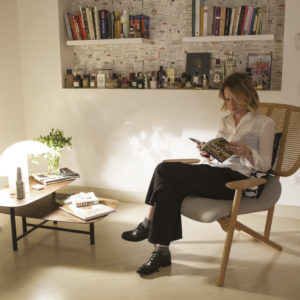Dopo il diploma, conseguito al liceo classico, si è concessa un anno di riflessione per poi iscriversi all’istituto Suor Orsola Benincasa e, con cognizione di causa, laureandosi nel 2003 in pedagogia, in scienze dell’educazione, tutt’oggi è educatore professionale. Costanza Cerrotta, da subito, ha deciso di mettere la sua professione a servizio dei bambini autistici ed accompagnarli nel loro percorso di crescita.
“La mia intenzione era quella di lavorare con i bambini che avevano handicap, indirizzando i miei studi per questo scopo. Ho fatto tirocinio a Napoli e soprattutto nei centri di recupero con disabili. Esperienze meravigliose che mi hanno permesso di seguire, sia in varie città che a Capri, ragazzi autistici”.
Purtroppo però Costanza ha riscontrato problemi di salute che le hanno impedito di continuare la sua professione, e costretta, per non affaticarsi, a smettere.
“Ad un certo punto la mia vita è cambiata, per cui non potendo svolgere l’attività che facevo, dentro di me è scattata la molla di mettere in pratica la mia scrittura”.
Sin da piccola, Costanza Cerrotta, ha sempre avuto un’innata vocazione a giocare con la fantasia e la passione per la scrittura, per cui ha deciso di scrivere un libro.
“Inventare storie e favole, scrivere racconti è una cosa che mi accompagna da quando sono nata. Questo, infatti, da bambina era il mio mondo, poi accantonato per dedicarmi prima agli studi e poi alla famiglia. Ho tirato fuori questa mia creatività, non solo letteraria ma anche manuale, quando mi sono dovuta ritirare, appunto, per problemi di salute. Un bel giorno, nel 2015, è nata Dorina, la bambina del mio libro, che si avventura nel mare con le tante creature che lo abitano”.
Nel 2016 Costanza Cerrotta ha pubblicato il suo primo libro “Dorina nel mare incantato”, e simultaneamente organizzava laboratori creati ad hoc con letture, e, inventando favole, dove la partecipazione dei bambini era molto attiva. La storia d Dorina è diventata anche spettacolo teatrale grazie alla collaborazione di attori capresi e Costanza ne ha scritto la sceneggiatura. Regia di Elisa Flores. Dopo poco il suo secondo libro.
“’Dorina e la neve magica’, e di concerto sono arrivati altri laboratori ed altre attività, grazie anche alle maestre che a scuola hanno portato i miei libri facendoli leggere ai bambini. Le storie di Dorina mi hanno dato la possibilità di incontrare tanti bambini nelle biblioteche di Roma, Frosinone, Napoli e qui a Capri. Esperienze meravigliose, che mi hanno dato la possibilità di rimettermi nuovamente in gioco, portando oltre la letteratura anche materiali per la creazione dei personaggi fatti insieme ai bambini. Viene a crearsi una lettura attiva dei miei libri”.
Costanza Cerrotta è pronta per la pubblicazione del suo terzo libro, dove sono presenti dieci racconti di Dorina e le sue magiche avventure, e, oltre ai racconti ci sono disegni illustrativi, fatti da sua figlia Michela, che con tanta dedizione ha partecipato alla creazione di quest’altra opera. Da professionista del settore può anche consigliare come indirizzare al meglio i bambini ed integrarli nella società dove vivono.
“Oggi si avverte nei bambini molta passività e inerzia e lo siamo diventati anche noi adulti per la forte influenza delle nuove tecnologie. Il cellulare è divenuto punto focale per tutte le attività quotidiane, senza il quale siamo impossibilitati a muoverci e se capita di dimenticarlo a casa andiamo in tilt. Il telefonino ci ha reso prigionieri di noi stessi, non potendone fare a meno. Questa situazione sociale si riversa anche sui bambini, che assorbono questo nostro modo di fare e anche loro sono diventati molto individualisti, per cui le interazioni sono diventate molto più difficili, anche tra coetanei che difficilmente si guardano negli occhi e si conoscono veramente. Una soluzione per aprirci l’uno con l’altro, per conoscersi e capirsi, potrebbe essere quella di riportare i bambini ad essere un po’ più responsabili e attori protagonisti della loro esistenza, quindi meno passivi e più attivi alla quotidianità. Si potrebbero, quindi, organizzare attività sul territorio con le quali si permette al bambino non solo di assorbire nozioni ma anche di attuarli, mettere in pratica. Per esempio, si potrebbero organizzare uscite di gruppo e stabilire ogni qualvolta un percorso. Capire la realtà di un luogo e prendersene cura. ‘Adottiamo una panchina, adottiamo un aiuola’ significa, che dopo aver fatto laboratorio, che sia di pittura o di giardinaggio, è importante mettersi in gioco ognuno con le proprie capacità e responsabilità, prendendosi cura anche del bene comune”. Costanza si ispira a Gianni Rodari, e ai suoi insegnamenti, uno degli scrittori italiani più amati dai bambini.
LOVE FOR CHILDREN IN FAIRYTALES
After graduating at a classical high-school, she took one year of reflection and then she enrolled in the Suor Orsola Benincasa Institute and, an informed choice, after graduating in 2003 in Pedagogy and Science Education, today is a professional educator. Costanza Cerrotta, has soon decided to put her skills at the service of autistic children, to guide them in their growth.
“My objective was working with children with disabilities, directing my studies towards this subject. I did a traineeship in Naples, particularly in rehabilitation centers with disabled people. Wonderful experiences that allowed me to follow autistic children in various cities and in Capri”.
Unfortunately, Costanza suffered from health issues that prevented her to continue her work, and forced her, to not fatigue herself too much, to quit it.
“At one point, my life changed, and I couldn’t do my job, so inside me the spark to practice my writing was ignited”.
Ever since she was a child, Costanza Cerrotta, always had a natural vocation for playing with imagination and a passion for writing, so she decided to write a book.
“Imagining stories and fables, writing tales is something that accompanies me ever since I was born. This, indeed, was my world when I was a child, a world I set aside to dedicate myself to my studies and family. I brought this creativity out, not just literary but also manual, when I had to quit my job for health reason. One day, in 2015, Dorina was born, the little girl in my book who explores the sea with its many creatures”.
In 2016 Costanza Cerrotta published her first book “Dorina nel mare incantato/Dorina in the enchanted sea”, and simultaneously she organized ad-hoc workshops with lectures and fables, where the children’s participation was very active. Dorina’s story has also become a theatrical piece thanks to the collaboration of Caprese actors, screenplay written by Costanza and directed by Elisa Flores. Before long, her second book.
“’Dorina e la neve magica/Dorina and the magic snow’, in concert with many other workshops and activities, also thanks to the teachers who brought my books at school for the children to read. Dorina’s stories gave me the opportunity to meet many children in the libraries of Rome, Frosinone, Naples and here in Capri. Wonderful experiences, that allowed me to put myself back in the game, bringing not only my books but also all the materials to create the characters together with the children. It becomes an active reading of my books”.
Costanza Cerrotta is ready to publish her third book, which consist of ten new tales of Dorina and her magic adventures, and, this time with illustrations drawn by her daughter Michela, who with much dedication has participated in the creation of this new work. As a professional in the field she can also properly guide the children and integrate them in the society they live in.
“Today, you can feel in children a lot of passivity and inactivity and we adults have become like this as well because of the strong influence of the new technologies. The smartphone has become the focal point of all daily activities, without it we cannot move and if we happen to forget it at home we feel lost. The smartphone made us prisoners of ourselves, as we cannot live without it. This social issue affects children as well, as they assimilate our attitudes, they have become themselves very individualist, and social interactions have become much more difficult, even among peers who hardly look at each other in the eyes and are not acquainted. A solution to open ourselves to others, to know and understand us, could be letting the children being more responsible and protagonists in their lives, less passive and more active in everyday life. We could, therefore, plan activities on the territory, so that children could not only assimilate notions, but also put them into practice. For example, we could plan outdoors trips and choose every time a different theme. Understanding the reality of place and taking care of it. ‘Adopt a bench, adopt a flower bed’ means, that after participating in a workshop, be it on painting or gardening, it is important for everyone to work with their capacity and responsibility, taking care of the common good”.
Costanza is inspired by the teachings of Gianni Rodari, one of the most appreciated Italian artists among children.











No Comments